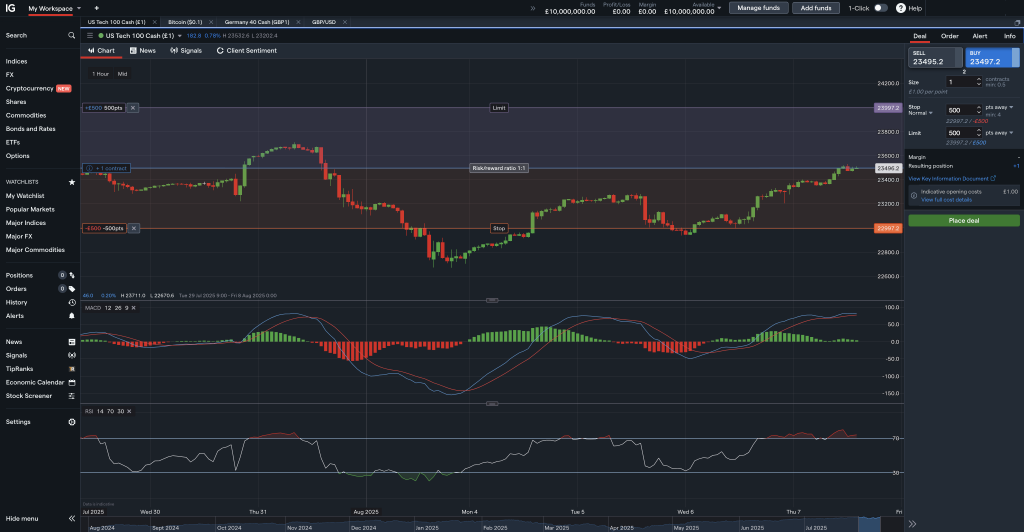Best Brokers For Swing Trading Futures 2026



Swing trading futures demands precision, timing, and the right tools. Whether you’re riding multi-day trends or capitalizing on short-term momentum, your broker can make or break your edge.
We reveal the best brokers for swing trading futures—low fees, powerful platforms, and fast execution included.
Top Brokers For Futures Trading for United States











How SwingTrading.com Chose The Best Futures Brokers
We reviewed the specific futures offering at each shortlisted broker, assessing factors such as the range of contracts, market variety, fees, margin terms, and platform tools. Drawing on our industry experience and a dataset of over 200 criteria, we assigned overall ratings to each provider and ranked them accordingly.
How To Pick The Right Broker For Swing Trading Futures
- Cost efficiency matters—but it’s not just about the headline per-contract fee. Some brokers charge exchange and clearing fees separately, while others bundle them in. Look closely at how commissions scale with volume and whether lower rates are accessible for non-day traders. Since swing positions may last multiple days, overnight margin usage can also incur additional costs not apparent at first glance.
- Unlike intraday futures trading, swing traders must hold positions through market closes and overnights, which means higher margin requirements. Brokers vary widely in their overnight margin policies—some require full exchange margin, while others offer reduced rates depending on your account and history. Understanding these rules will help you to avoid forced liquidations or unexpected margin calls during low-liquidity sessions.
- Swing traders don’t need lightning-fast scalping fills, but they do need consistent execution when placing trades during key levels, breakouts, or overnight volatility. Look for brokers that support advanced order types like OCO (one-cancels-the-other), GTC (good-till-cancelled), bracket orders, and conditional entries based on technical triggers. These tools are essential for automating trade management in a swing setup.
- A good trading platform should offer more than just a clean interface—it needs to be rock-solid during volatile market events. For swing traders relying on multi-day trend structures, the platform must also support advanced charting features, custom indicators, and multi-timeframe analysis. Latency, platform crashes, or poor mobile access can lead to missed exits or poor trade management.
- Not every broker offers complete access to the futures market. A good swing trading broker should provide access to core contracts like the E-mini S&P 500, crude oil, treasuries, and commodities—as well as micros for smaller positions. It’s also important to consider how brokers handle contract rollovers, as swing trades may span expiration dates.
- Swing traders often base entries and exits on precise price action and volume behavior, so delayed or unreliable data can be costly. Some brokers charge for real-time data or offer only snapshot quotes by default. Depth-of-market (DOM), Level 2 quotes, and tick-level historical data are valuable tools when planning multi-day trades or managing risk overnight.
- A broker’s built-in risk tools—like margin impact previews, automated stop placement, or real-time P&L tracking—can help you maintain discipline and avoid overexposure. But just as important is the broker’s reliability during fast-moving markets. The best brokers provide transparency around outages, quick customer support, and platform performance history during volatile periods. When holding positions overnight, trust in your broker becomes part of your edge.
Choosing a futures broker isn’t just about low fees—it’s about trust. You need a platform that won’t freeze in volatile moments, a margin policy that won’t surprise you overnight, and execution that hits when it matters.I’ve learned the hard way that a cheap trade can become an expensive lesson with the wrong broker.
What Is Futures Trading?
Futures trading is the buying and selling of standardized contracts to deliver a specific asset—like crude oil, corn, or the S&P 500—at a set price on a future date. For swing traders, it’s a way to capitalize on short- to medium-term price moves in highly liquid markets with built-in leverage.
Unlike stocks, futures trade nearly 24/7 and settle daily, which means gains—and losses—can compound fast. It’s not about predicting the future; it’s about managing risk in a market that rewards discipline over certainty.

IG lets you trade futures using its OTC products: spread bets and CFDs
Pros Of Swing Trading Futures
- 24-hour market access: Futures trade nearly 24 hours a day, five days a week. For swing traders, this is a real edge—you’re not trapped by the stock market’s open/close cycle. If a major economic event hits overnight or a global market moves sharply, you can respond in real-time. It’s not about chasing every tick, but having the flexibility to manage risk or adjust positions on your terms.
- Leverage efficiency: Futures contracts are inherently leveraged, often requiring just 3–12% of the contract’s notional value as margin. That means a relatively small account can control significant market exposure. For swing traders, this is powerful—but it’s a double-edged sword. It magnifies both gains and losses, so risk per trade must be tightly controlled. Used correctly, though, it allows for capital efficiency and diversification across multiple positions.
- Liquidity & tight spreads: Major contracts like the E-mini S&P 500, crude oil, and treasury futures trade with high volume and low slippage, even during pre-market or overnight sessions. This means your stop-losses and limit orders are more likely to fill at expected prices—critical when you’re holding positions across multiple days. Unlike thinly traded stocks, the depth of futures markets helps you stay precise with entries and exits.
Cons Of Swing Trading Futures
- Leverage cuts both ways: While futures give you access to large positions with minimal margin, that same leverage can amplify losses quickly. A small move against your position can lead to outsized drawdowns—or even a margin call—if risk isn’t tightly managed. You need to size positions carefully, use stop-losses consistently, and be aware that holding overnight adds exposure to sudden price gaps.
- Overnight risk & volatility: Holding futures positions overnight means you’re exposed to global news, economic data, or geopolitical events that can trigger significant moves during illiquid hours. While the 24-hour market allows for flexibility, it also introduces the risk of slippage or gapping through your stop levels, especially during low-volume periods. It’s part of the game—but it demands you size accordingly and avoid overexposure.
- Complexity & learning curve: Futures trading isn’t beginner-friendly. Each contract has its specifications—tick size, margin requirements, expiration cycles, rollover procedures—and missing any of these details can cost you. Plus, futures are taxed differently, regulated differently, and move faster than most stock-based instruments. To trade them well, you need to commit to learning the mechanics inside and out—not just the chart patterns.
There was a time I focused so much on charts and setups that I ignored the margin requirements—until a position got auto-liquidated overnight. That’s when I realized in futures trading, understanding your broker’s margin rules is just as important as picking the right trade.
Bottom Line
Swing trading futures demands precision and smart risk management—and the right broker can make all the difference.
The best brokers combine low commissions, fast execution, and reliable platforms with the tools swing traders use, like advanced charting and flexible margin.
Whether you’re trading forex, indices, or commodities, choosing the best broker for swing trading futures that aligns with your strategy is just as important as the trades you take.
FAQ
Do All Brokers Offer The Same Access To Futures Markets And Products?
No. While many brokers offer popular contracts like the E-mini S&P 500, not all provide access to niche or international futures markets from our tests. Some brokers also limit advanced order types or charge higher data fees.
Make sure your brokerage offers the specific contracts, platforms, and data feeds you need for your swing trading style.
